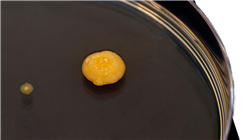University certificate
The world's largest faculty of pharmacy”
Description
This program will provide you with a comprehensive understanding of how Proteomic and Genomic techniques are applied in Clinical Microbiology to improve the diagnosis and treatment of complex infections”

In today's Clinical Microbiology, Proteomics has emerged as a crucial tool for the identification and characterization of microorganisms. For example, the MALDI-TOF mass spectrometry technique is especially noted for its ability to rapidly identify bacteria, fungi and parasites by peptide fingerprinting, which is unique to each microorganism.
This is how this program is born, which will cover the introduction to Proteomics in the Microbiology laboratory, addressing its evolution, development and relevance in microbiological diagnosis, with special attention to the Proteomics of Multidrug-Resistant Bacteria. Therefore, pharmacists will be immersed in qualitative and quantitative techniques for protein separation, such as Two-Dimensional Electrophoresis (2DE), DIGE technology, isotopic labeling, High Performance Liquid Chromatography (HPLC), and Mass Spectrometry (MS), including MALDI-TOF technologies.
Likewise, the applications of MALDI-TOF mass spectrometry in Clinical Microbiology will be examined, highlighting its use in the identification of microorganisms, characterization of antibiotic resistance and bacterial typing. In addition, essential bioinformatics tools for proteomic analysis will be introduced, such as databases and protein sequence analysis tools, together with proteomic data visualization techniques.
Finally, Genomics in Clinical Microbiology will be discussed in depth, covering its evolution, importance in diagnosis, and genomics of multidrug-resistant bacteria, as well as different types of sequencing and its applications in epidemiological surveillance and microbial diversity studies. The future of Genomics and Proteomics in the clinical laboratory will also be explored, addressing recent and future advances, as well as the development of new therapeutic strategies.
Therefore, TECH has implemented a complete and fully online university program, accessible from any electronic device with an Internet connection. Additionally, it is based on the revolutionary Relearning learning methodology, which focuses on the systematic review of key concepts to ensure a solid and fluent understanding of the contents.
You will cover Genomics in the Microbiology laboratory, addressing its evolution, importance in diagnosis and its application in the study of multidrug-resistant bacteria. With all the TECH quality guarantees!"
This Postgraduate certificate in Proteomics in Clinical Microbiology contains the most complete and up-to-date scientific program on the market. The most important features include:
- The development of practical cases presented by experts in Microbiology, Medicine and Parasitology.
- The graphic, schematic and eminently practical contents with which it is conceived gather scientific and practical information on those disciplines that are indispensable for professional practice
- Practical exercises where self-assessment can be used to improve learning
- Its special emphasis on innovative methodologies
- Theoretical lessons, questions to the expert, debate forums on controversial topics, and individual reflection assignments
- Content that is accessible from any fixed or portable device with an Internet connection
You will master bioinformatics tools for Genomics, including databases and genomic sequence analysis, as well as data visualization, thanks to an extensive library of multimedia resources”
The program’s teaching staff includes professionals from the field who contribute their work experience to this educational program, as well as renowned specialists from leading societies and prestigious universities.
The multimedia content, developed with the latest educational technology, will provide the professional with situated and contextual learning, i.e., a simulated environment that will provide immersive education programmed to learn in real situations.
This program is designed around Problem-Based Learning, whereby the professional must try to solve the different professional practice situations that arise during the course. For this purpose, students will be assisted by an innovative interactive video system created by renowned and experienced experts.

You will delve into the practical applications of MALDI-TOF in Clinical Microbiology, highlighting the identification of microorganisms, characterization of antibiotic resistance and bacterial typing. Enroll now!"
Syllabus
The contents of this academic program will cover from the theoretical foundations of Proteomics to its practical application in the diagnosis, prognosis and treatment of infectious diseases. Topics such as mass spectrometry, bioinformatics analysis, proteomic biomarkers and the integration of proteomics in personalized pharmacotherapy will also be addressed. In addition, professionals will acquire key competencies to interpret and apply proteomic data, promoting significant advances in health care based on solid and updated scientific evidence.

This program will offer you a comprehensive program, designed to explore in depth the advanced techniques and applications of Proteomics in the context of Clinical Microbiology”
Module 1. Proteomics in Clinical Microbiology
1.1. Proteomics in the Microbiology Laboratory
1.1.1. Evolution and Development of Proteomics
1.1.2. Importance in Microbiological Diagnosis
1.1.3. Proteomics of Multi-Resistant Bacteria
1.2. Qualitative Protein Separation Techniques
1.2.1. Two-Dimensional Electrophoresis (2DE)
1.2.2. DIGE Technology
1.2.3. Applications in Microbiology
1.3. Quantitative Protein Separation Techniques
1.3.1. Isotopic Labelling
1.3.2. High Performance Liquid Chromatography (HPLC)
1.3.3. Mass Spectrometry (MS)
1.3.3.1. MALDI-TOF Technologies in the Clinical Microbiology Laboratory
1.3.3.1.1. VITEK®MS System
1.3.3.1.2. MALDI Biotyper® System
1.4. MALDI-TOF Applications in Clinical Microbiology
1.4.1. Identification of Microorganisms
1.4.2. Characterization of Antibiotic Resistance
1.4.3. Bacterial Typing
1.5. Bioinformatics Tools for Proteomics
1.5.1. Proteomic Databases
1.5.2. Protein Sequence Analysis Tools
1.5.3. Visualization of Proteomic Data
1.6. Genomics in the Microbiology Laboratory
1.6.1. Evolution and Development of Genomics
1.6.2. Importance in Microbiological Diagnosis
1.6.3. Genomics of Multi-Resistant Bacteria
1.7. Types of Sequencing
1.7.1. Sequencing of Genes with Taxonomic Value
1.7.2. Sequencing of Genes of Taxonomic Value
1.7.3. Bulk Sequencing
1.8. Applications of Massive Sequencing in Clinical Microbiology
1.8.1. Whole Bacterial Genome Sequencing
1.8.2. Comparative Genomics
1.8.3. Epidemiological Surveillance
1.8.4. Microbial Diversity and Evolution Studies
1.9. Bioinformatics Tools for Genomics
1.9.1. Genomic Databases
1.9.2. Sequence Analysis Tools
1.9.3. Visualization of Genomic Data
1.10. Future of Genomics and Proteomics in the Clinical Laboratory
1.10.1. Recent and Future Developments in Genomics and Proteomics
1.10.2. Development of New Therapeutic Strategies
1.10.3. Technical and Bioinformatics Challenges
1.10.4. Ethical and Regulatory Implications

You will access a comprehensive approach to advanced proteomic analysis techniques, applied to the study of clinically relevant microorganisms, through the best teaching materials in the academic market”
Postgraduate Certificate in Proteomics in Clinical Microbiology
This Postgraduate Certificate in Proteomics in Clinical Microbiology developed by TECH Global University is an advanced specialization, which offers a detailed understanding of how proteomic techniques can revolutionize the diagnosis and treatment of infectious diseases, thus improving clinical outcomes. During the program, delivered in 100% online mode, you will explore the fundamentals of proteomics, including protein analysis and identification, and its application in clinical microbiology. In addition, key topics such as the detection of protein biomarkers, the identification of pathogens through proteomic profiling, and the development of new therapeutic strategies based on proteomics will be addressed. Finally, the use of advanced tools and technologies such as mass spectrometry and bioinformatics in proteomics research will be discussed. One of the outstanding features of this course is its focus on the practical application of proteomics in the clinic. Thus, you will learn how to interpret proteomic data, develop or validate proteomic methods for the diagnosis of infections and implement these techniques in clinical settings to improve diagnostic accuracy and treatment personalization.
Specialize in Proteomics in Clinical Microbiology
The online modality of the course provides flexibility and accessibility, allowing you to access the content from any location and at times that suit your work and personal commitments. Through an advanced educational platform, you will benefit from interactive resources and updated study materials in proteomics and clinical microbiology. The course is led by a team of professionals with extensive experience in proteomics and clinical microbiology, who provide expert guidance and ongoing support throughout the program. Their practical experience and up-to-date knowledge ensure high quality training relevant to the current needs of the healthcare field. Enrolling in this Postgraduate Certificate is a strategic decision for health professionals and scientists who wish to be at the forefront of research and clinical practice. This advanced program provides the tools and knowledge necessary to harness the potential of proteomics in the diagnosis and treatment of infectious diseases, thus contributing to the advancement of clinical microbiology and the improvement of patient care.







